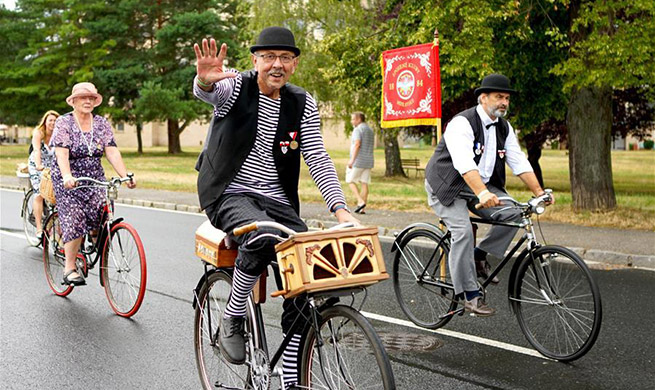by Eric J. Lyman
ROME, Aug. 10 (Xinhua) -- The new rules about fining people sitting down on iconic Spanish Steps in Rome has provoked mixed reactions.
Last week the Rome municipal government began to crack down on tourists who sit on any of the 174 steps that start at Piazza di Spagna and climb up to the Piazza Trinita della Monti.
Advocates of the ban argue that the huge number of tourists sitting on the steps make it difficult to navigate them and they often leave behind garbage. They say it is part of a wider effort to clean the city up and making it more attractive to tourists.
The policy allows the authorities to fine people 250 euros (280 U.S. dollars) for sitting on the steps for any amount of time. The fine can be increased to 400 euros (450 U.S. dollars) if the person in question leaves trash behind or damages the steps in some way.
But the move has not been a popular one among most Romans, who are accustomed to interacting with the historical riches of the city they live in.
"This is a typical Roman case of misplaced priorities," said Vittorio Sgarbi, a member of parliament and one of the country's most high-profile political and social commentators, told Xinhua. "Does it really make sense, with all the problems Rome has, to punish people who might want to sit on the steps to read a few passages from Keats or Shelley, who lived and wrote right next door?"
Sgarbi was referring to English poets John Keats and Percy Shelley who lived in a house adjacent to the Spanish Steps, which now serves as a museum.
Massimo Tonelli, founder of "Roma fa Schifo", a group that calls attention to the city's shortcomings, agreed.
"Did you know the Spanish Steps were designed in the 18th century by the architect Francesco de Sanctis to be sat on?" Tonelli asked in an interview. "If you look at the steps, some on the sides are shaped differently. Those are for sitting."
Tonelli went on: "The city has very many problems, but this isn't one of them," he said.
Not everyone is opposed to the new measure. Paola Fagioli, head of the tourism division for the environmental lobby group Legambiente, said that while she understood criticisms of the rules, she thinks they are ultimately a good thing.
"Rome has to protect its cultural riches and sometimes that requires certain steps that aren't popular at first," Fagioli told Xinhua.
There were police roaming the steps Saturday, telling anyone who began to sit down that doing so was illegal. Police told Xinhua they were unaware if anybody had yet been charged under the new rule, saying the fines were meant to act as a deterrent. The deterrent seemed to work: people were walking up and down the steps and pausing to take photos but nobody was sitting.
Visitors gave the new rules mixed reviews.
Paolo Ricci, a Roman pharmacist, said some of the attention given to the steps should be applied elsewhere in the city.
"It seems peculiar to me that they are putting so much attention on the Spanish Steps and yet you can walk around the corner and find graffiti on the walls and people dropping trash in the street," Ricci told Xinhua.
William Zhou, a Chinese student visiting Rome from London, where he studies international affairs, had a similar view.
He said in a brief interview that if the Italian authorities "are going to enforce a rule like this, they should do it evenly, in the whole city."













